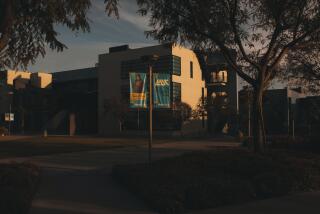Despite Criticism, College Strives to Make the Grade : Faculty and administrators at Pierce have been making solid progress in rectifying shortcomings listed in last summer’s accreditation report.
- Share via
The Los Angeles Times was finally making great strides toward recognizing community colleges as a viable higher education alternative. From no mention at all in articles regarding the cost of higher education, The Times has recently published articles in which community colleges were suggested as an option for beginning a higher education . . . albeit with apology. In the Oct. 1 Times Valley Edition, the editorial even mentioned that some students “should undoubtedly enroll first in a two-year program.” The editorial then proceeded to blast Pierce College for its recent accreditation review.
Perhaps the paper is making up for lost time. The Pierce accreditation report was received by the college and made public in June. The Times printed a front-page news article on this report at the end of September. Not exactly breaking news! The Oct. 1 editorial presents a litany of concerns as if no one had heard of them before or taken any action regarding them. May I respond to a few:
“ . . . revolving door for top administrative posts . . . “
The Board of Trustees has formed a selection committee, which is in the process of selecting a permanent president.
” . . . its scant efforts in marketing the school and recruiting students . . . “
Three newsprint advertisements have been printed and distributed to more than 200,000 people through the Los Angeles Times’ own Selected Market Coverage Program as well as advertisements in other papers, on television and in movie theaters. High school enrollment has increased and Pierce College still transfers more students than any other college in the Los Angeles district to four-year colleges and universities.
“ . . . a mismatch between offerings and student needs. . . . “
I seem to remember an article in The Times last spring chastising the Pierce College president for daring to move ahead on eliminating and reducing industrial technology programs that were no longer in demand. This fall semester, with 48 faculty retirements, more courses in English, mathematics and science are being offered.
“ . . . an apathetic staff that appears to have ‘given up’ . . . “
It is true that some faculty who have taught nearly half a century at the college see change as quite threatening; this is not true for the majority of the faculty who remain active in their academic fields and involved in college activities, including accreditation.
An “uncertain future and lack of financial reserves” are problems with which the college has yet to wrestle.
No college in the state has the talent and resources that Pierce College is privileged to have. I see the future of the college as unlimited with potential for innovative programs such as tourism, entertainment and the brokering of agricultural programs internationally. International business was recently added to the curriculum. The combination of location, community support and business involvement combined with an outstanding instructional staff is unbeatable.
It is true that Pierce College did not meet “the commission’s earlier requirements and timetables.”
We cannot go back in time to correct this. The important emphasis for the faculty, students, staff and administrators currently at Pierce College is to become involved in the process of making this institution the best in the state. Recommendations from the accreditation team were assigned to specific individuals and groups at the college back in July. Many of these recommendations have already been addressed. In the meantime, Pierce College remains fully accredited.
In the accrediting commission’s report there were also several commendations for a job well done. Interestingly, these commendations never appeared in print. Perhaps The Times is saving them for a front-page story in the future. In response to The Times article and editorial, we would appreciate having an objective article on our progress toward meeting the accrediting commission’s recommendations published by The Times in the spring.
More to Read
Sign up for Essential California
The most important California stories and recommendations in your inbox every morning.
You may occasionally receive promotional content from the Los Angeles Times.













